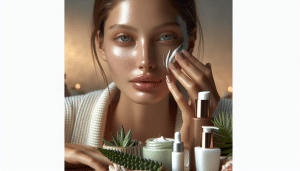Are Peptide Serums Changing Skincare for You
Natalie Brooks August 31, 2025
Explore how peptide serums are capturing attention among wellness and beauty enthusiasts. Learn more about the science, benefits, user experiences, and what to consider before selecting these trending products for your own skincare routine.
Understanding Peptides and Their Role in Modern Skincare
Peptides have become a profound buzzword in the wellness and beauty community. These tiny chains of amino acids serve as building blocks for proteins like collagen and elastin, which are essential for healthy, youthful-looking skin. Because of their structure, peptides can communicate with skin cells, triggering signals that help rejuvenate and support the skin’s barrier. As this science emerges, a growing number of skincare products now include specific peptide formulas designed for topical use.
The appeal of peptides in skincare partly lies in their multifunctionality. Certain peptides are designed to penetrate the skin and stimulate natural collagen production, improving firmness over time. Others help soothe inflammation or assist the skin’s self-repair mechanisms after minor damage. Dermatological research supports the role of peptides in managing visible aging signs, and their gentle nature makes peptide serums compatible with sensitive skin types (Source: https://www.aad.org/public/diseases/a-z/skin-care-ingredients).
Curiosity about peptides extends beyond their basic benefits. Many wonder how peptides differ from better-known ingredients like hyaluronic acid or retinol. Unlike those, peptides target skin support at the molecular level, often working together with other ingredients for compounded effects. Some serums pair them with antioxidants for added protection, while others focus solely on peptide concentrations for maximized results. With variety and innovation continually shaping the field, interest in these advanced topical ingredients keeps rising.
Benefits of Peptide Serums for Daily Skincare Routines
Peptide serums are increasingly integrated into daily wellness and beauty routines due to their proven benefits. Many users report improvements in skin texture, elasticity, and hydration levels after consistent use. These serums can deliver a boost of targeted nourishment, especially for those aiming to minimize signs of fine lines and wrinkles. Unlike some potent actives, peptides are typically non-irritating, making them suitable for ongoing morning and evening applications.
Among the standout properties of peptide serums is their versatility. Whether used as part of a preventive routine or to address visible age-related changes, these formulations cater to a range of needs. According to dermatological reviews, peptides may help reinforce the skin barrier, promote smoothness, and support the natural renewal process. Several peer-reviewed sources indicate daily use can lead to added firmness and a visibly brighter complexion (Source: https://www.ncbi.nlm.nih.gov/pmc/articles/PMC6047273/).
Apart from anti-aging, peptide serums often show results for those seeking resilience in their skin against environmental stressors. Some peptides incorporate additional benefits such as calming redness or reducing the visual impact of dark spots. Gentle yet effective, peptide serums are often recommended by skincare specialists for mature skin, reactive complexions, and those recovering from cosmetic treatments.
How Peptides Compare to Other Skincare Ingredients
Peptide serums belong to a class of next-generation actives that stand out from classic skincare ingredients. While retinoids and vitamin C serums still hold value for reducing photoaging and brightening the skin, peptides bring complementary advantages. They function by communicating signals that prompt skin cells to produce or conserve more collagen. This internal boost is different from the exfoliating or antioxidant actions of other favorites.
Unlike retinol, which can sometimes cause irritation in sensitive individuals, peptides are usually well-tolerated. Their compatibility with other actives allows for multi-step routines, combining hydration, wrinkle reduction, and barrier support in one streamlined process. Integration alongside hyaluronic acid or ceramides is common, helping lock in moisture and reinforce results (Source: https://www.health.harvard.edu/staying-healthy/the-science-of-skin-care-products).
The wide selection of actives often leads to questions about effectiveness and synergy. Skincare professionals suggest peptides can serve as an anchor in a daily routine—either as a primary serum or a supplementary layer to complement retinoids and antioxidants. The combination may lead to smoother, more resilient skin, supporting individual needs while recognizing that no single ingredient delivers universal results for every complexion.
What to Know Before Choosing a Peptide Serum
Choosing a peptide serum involves more than picking a trending label. It’s critical to understand formulation details. Look for serums with well-identified peptides, such as palmitoyl pentapeptide or copper peptide, both of which have clinical data supporting their claims. The ingredient list often reflects the serum’s overall concentration level, which can indicate potency.
With so many choices, comparing peptide products based on formulation and brand reputation becomes important. Dermatologists recommend checking that serums are fragrance-free and suitable for your skin type. Reading third-party clinical studies or user reviews can also provide additional confidence in selecting a serum. Understanding the packaging matters as well, since peptides are sensitive to air and light. Opaque, pump-style bottles tend to preserve product stability best (Source: https://www.dermatologytimes.com/view/peptides-in-dermatology).
No serum guarantees immediate transformation. Most experts agree that visible results develop gradually, often taking four to twelve weeks, depending on consistent use and individual skin response. Integrating a peptide serum should be seen as a part of holistic skincare, alongside other essentials like SPF and a barrier-protecting moisturizer, to optimize benefits while maintaining realistic expectations.
User Experiences and Dermatologist Recommendations
Real-world testimonials highlight why peptide serums resonate with so many individuals. People frequently describe noticing smoother texture, reduced fine lines, and more luminous skin after integrating peptides into their regimen. This anecdotal support is echoed in consumer forums and survey feedback from reputable dermatology clinics, which further spurs curiosity in trying peptide-focused products.
Dermatologists, meanwhile, approach peptide serums from a scientific standpoint. Many recommend them as a complementary approach for those interested in non-invasive anti-aging solutions. Professionals emphasize the importance of selecting clinically tested formulas and combining peptide use with sun protection to reinforce gains and minimize photoaging (Source: https://www.aad.org/public/everyday-care/skin-care-secrets/anti-aging/anti-aging-skin-care-products).
Professional recommendations often align with practical habits. Using peptide serums on clean, damp skin maximizes absorption, while consistent morning or nighttime application ensures sustained impact. Ultimately, integrating dermatologist insights and user reviews gives shoppers a balanced perspective, empowering informed choices tailored to individual skin wellness goals.
Future Trends in Peptide-Based Skincare Solutions
The evolution of peptide serums is far from complete. Ongoing research aims to develop new synthetic peptides targeting specific skin needs—such as reducing pigmentation, protecting against environmental toxins, or accelerating cellular recovery. Some laboratories are experimenting with custom peptide blends designed for unique genetic skin profiles, promising even greater efficacy.
In addition to formulation advances, packaging and delivery methods continue to improve. Innovations like encapsulated peptides or bio-compatible carriers seek to boost stability and penetration, maximizing each application’s impact. Sustainability is also increasingly relevant, as brands look for ways to source and manufacture peptides in eco-friendly ways (Source: https://www.skininc.com/science/ingredients/news/21892935/the-chemistry-of-peptides-in-skin-care).
Looking ahead, peptide serums are expected to remain a central part of the wellness and beauty landscape. Their growing body of research-backed benefits and the adaptability of their formulations mean consumers will likely see new options and innovations for years to come. Staying informed about these developments keeps skincare practices current—ensuring that beauty routines benefit from the cutting edge of science and technology.
References
1. American Academy of Dermatology Association. (n.d.). Skin care ingredients. Retrieved from https://www.aad.org/public/diseases/a-z/skin-care-ingredients
2. Gorouhi, F., & Maibach, H. I. (2009). Role of topical peptides in preventing or treating aged skin. International Journal of Cosmetic Science, 31(4), 327-345. Retrieved from https://www.ncbi.nlm.nih.gov/pmc/articles/PMC6047273/
3. Harvard Health Publishing. (n.d.). The science of skin care products. Retrieved from https://www.health.harvard.edu/staying-healthy/the-science-of-skin-care-products
4. Dermatology Times. (n.d.). Peptides in dermatology. Retrieved from https://www.dermatologytimes.com/view/peptides-in-dermatology
5. American Academy of Dermatology Association. (n.d.). Anti-aging skin care products. Retrieved from https://www.aad.org/public/everyday-care/skin-care-secrets/anti-aging/anti-aging-skin-care-products
6. Skin Inc. (n.d.). The chemistry of peptides in skin care. Retrieved from https://www.skininc.com/science/ingredients/news/21892935/the-chemistry-of-peptides-in-skin-care








